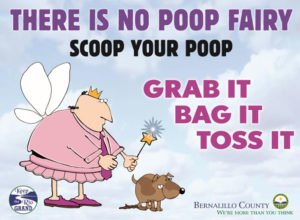Residential
Many household items are not safe for our water system. These items pollute our waterways when they are poured down the drain, on the ground or into storm sewers.
PET WASTE: Get rid of it the right way!
 Pet waste is fecal matter (poop) deposited by pets. When it isn’t picked up, it can be carried away by stormwater flows (streets, sidewalks, trails, yards, etc.)
Pet waste is fecal matter (poop) deposited by pets. When it isn’t picked up, it can be carried away by stormwater flows (streets, sidewalks, trails, yards, etc.)
- Pet waste can travel with stormwater runoff to the Rio Grande and can transmit diseases to other creatures.
- When walking with your pet, take a plastic bag along and dispose of the waste properly in a trash receptacle.
- Be aware of any Animal Control ordinances that govern pet waste clean up –if the law is violated, you could be subject to prosecution.
- Request a poop fairy yard sign
FLUIDS: Dispose of it properly!
- Return used motor oil for recycling: Never pour oil onto the street or down a storm drain. Most gas stations accept used oil, and so do many automotive stores.
- Remove automotive fluids from your driveway: Soak up liquids with wipes or absorb the surface oil with granular coconut husk or kitty litter/clay and dispose of in the trash receptacle. Once dry, wet the stain with water and scrub with a stiff brush and a paste made from baking soda and water, or a few drops of dish detergent. Absorb after 10–60 minutes. Repeat as needed.
- Keep fats, oils and grease out of storm drains
- Follow any instructions for use and disposal provided on product labels.
- Share unused products with friends, neighbors, or local groups.
- Never burn or bury hazardous waste; this can cause water and air pollution.
- Never pour hazardous waste down street drains or storm sewers, or dump along roadside.
YARD WASTE: Keep it clean!
Yard waste consists of leaves, grass, branches, and anything else from your yard. When it rains, it can be washed into the street and go down a storm drain.
- Compost them yourself or take them to your local compost facility
- Leave them in areas that are off the street
- Bag them and check out your local waste collectors' Green Waste Day:
TRASH: Clean it up!
- Never litter - always dispose of trash in a proper container
- Keep trash bins and recycling bins secure from wind until trash day
- Volunteer for trash clean-up events
- Try to avoid excessive packaging when making purchases
Household Hazardous Waste
Leftover household products that contain corrosive, toxic, flammable, or reactive ingredients are considered household hazardous waste. Products such as paints, cleaners, oils, batteries, and pesticides that contain potentially dangerous ingredients require special care when you dispose of them. The Household Hazardous Waste Collection Center accepts most of these wastes and there is no charge to use this resource:
Safety-Kleen
2720 Girard NE
Albuquerque, NM 87107
New hours
Monday, Wednesday, Friday 8 a.m. to 2 p.m. and Saturday 8 a.m. to 3 p.m.
Phone
505-884-2277
Refer to this link for a complete list of what is and is not accepted at the HHW facility.
Items that may be brought to the HHWCC
- Paints
- Fertilizers
- Cleaners
- Pesticides
- Pool chemicals
- Used motor oil
- Automobile batteries
- Propane bottles
- Maximum: 10 gal. or 40 lbs. Three sizes: Coleman camp stove, BBQ size, and RV size.
- Medical-grade oxygen cylinders
- Over-the-counter medications
Items not accepted at the HHWCC
- Explosives or ammunition
- Other compressed gases
- Radioactive waste
- Biomedical waste
- Business generated waste
- Non-hazardous waste
- Electronics/E-waste
- Appliances
- Tires
